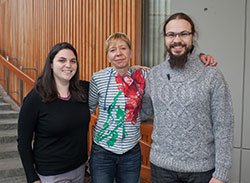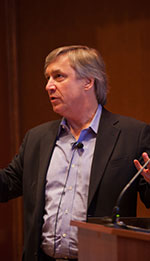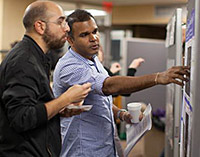

Symposium on Cell Trafficking and Polarity
METRAPOLIS 2012: Einstein Grad Students Host Symposium
When Dr. Anne Muesch, associate professor of developmental & molecular biology, saw a notice in Molecular Biology of the Cell, the online journal of the American Society of Cell Biology (ASCB) soliciting proposals for one-day symposia, she immediately thought of Aleksandr Treyer and Dawn Fernandez, graduate students studying epithelial cells in her lab. Dr. Muesch thought their particular area of research – membrane trafficking and polarity – could make for an interesting meeting.

Event organizers Dawn Fernandez and Aleksandr Treyer flank their mentor, Dr. Anne MueschTo the layman, "trafficking and polarity" might sound like the title of an action movie about smuggling illegal substances across borders. In fact, the phrase refers to two crucial cellular functions: Trafficking is the process by which nutrients and waste products are transported into and out of cells; polarity refers to how cells are organized into body tissue. Enhanced understanding of this process, said Mr. Treyer and Ms. Fernandez, could tell us a lot about health and disease, including cancer.
"Eighty percent of cancers are derived from epithelial cells," explained Ms. Fernandez. "A hallmark of cancer is when they lose polarity and start to grow out of control."
"Shedding light on cell trafficking and polarity also could bolster understanding of many normal developmental processes, including neonatal growth," added Mr. Treyer. "That's one of the nice things about basic science. You may not be certain what you are going to contribute, but the potential to contribute is vast."
Establishing METRAPOLIS 2012

Event presenter, Dr. Gregg Gundersen, of Columbia University, describes his workMr. Treyer and Ms. Fernandez decided that hosting a symposium - which they named METRAPOLIS 2012 by culling letters from the longer official title "Membrane Trafficking and Polarity Interest Symposium" - would give them a chance to meet interesting experts in their field. "New York is the perfect place to have a meeting since many great institutions are within a one-day radius," said Ms. Fernandez.
The duo selected a theme and then completed and submitted their symposium proposal to the ASCB. They also developed a list of possible speakers - specialists from nearby institutions, including Cornell, Mt. Sinai, and Yale.

Students and postdocs discuss their work during the poster sessionTo their surprise, they received a swift and positive response. The ASCB offered them $1,500. And, virtually all of their invited speakers said yes.
"The subject matter clearly touched a nerve," said Dr. Muesch.
Getting the ASCB grant was certainly a huge boost, but Mr. Treyer and Ms. Fernandez quickly realized that putting together a symposium would require more. Since basic cell research is relevant to the understanding of cancer, they approached Dr. I. David Goldman, director of the Albert Einstein Cancer Center. He provided an additional $1,000. The students also sought help from leadership of the graduate programs in biomedical sciences, who offered to pay for the end-of-day poster session. "It was great to have that kind of support," said Ms. Fernandez.
Filling Lefrak Auditorium
On the morning of November 27, 2012, LeFrak Auditorium in the Price Center/Block Research Pavilion was filled to capacity, with more than 100 attendees eager to hear from the symposium's speakers. Each focused their respective presentations on basic cell research topics such as "Cell Polarity and Signaling in Vertebrate Embryogenesis;" "Playing in Traffic: New Pathways and Signals in Epithelial Polarity;" and "Mechanisms of Primordial Gonad Assembly during C. elegans Embryogenesis."
The audience – pleased to be among peers who understand the work they are doing – was rapt. "I heard from a number of the speakers afterward that they wished this meeting would happen on a yearly or biannual basis," said Ms. Fernandez.
Whether that happens or not, it was clear to the two students that everyone involved appreciated the opportunity to hear from others in their field. Dr. Muesch summed up the day's event, noting: "It's refreshing to see fellow scientists digging into their own research, who also are interested in looking to the left and to the right to learn from others."
Posted on: Monday, January 28, 2013


